
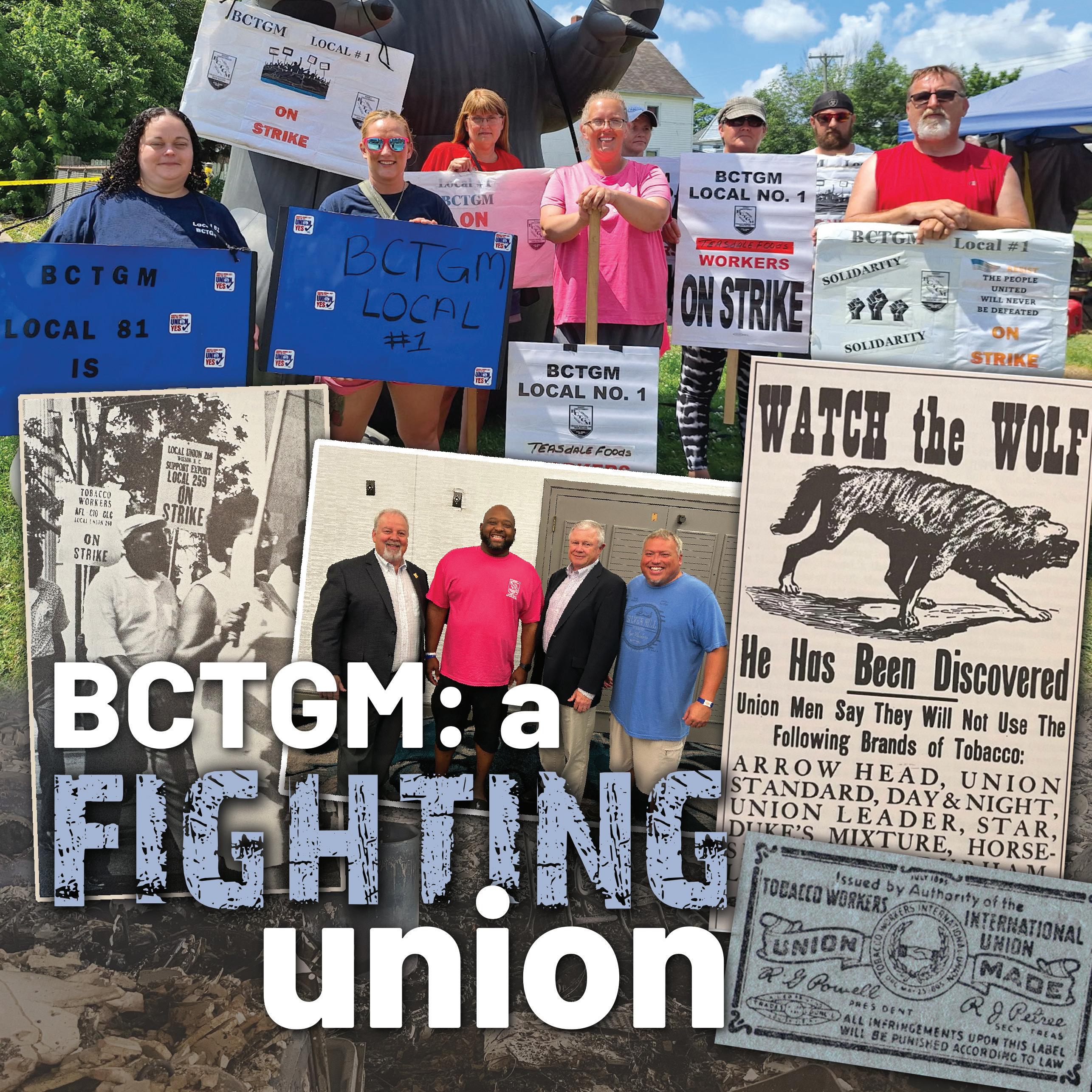





As I travel around the country visiting with members at their workplaces or at BCTGM regional conferences, I get a good opportunity to hear firsthand about the challenges workers are facing on the job and at home.
Most of the concerns I hear are what I refer to as “pocketbook” issues: high food prices, the cost of gasoline, rising healthcare and sky-high childcare costs.
These are the issues most workers want leaders at all levels of government to focus on.
At a time when the media and political commentators want to talk about a divided America, I think there is far more that unites us than divides us—especially when it comes to economic issues.
It is with this in mind that I approached the introduction of the president’s first budget.
For as long as I can remember, I have always asked myself three questions about an Administration’s budget:
1. Does it help or hurt BCTGM members and their families?
2. Does it improve the government agencies that oversee our members’ workplaces?
3. Does it help or hurt the larger labor movement?
I truly hope there are parts of the “Big Beautiful Bill” that will benefit working families. Based off my conversations with members, it’s clear they want prices to come down and more money in their accounts. However, after reviewing the Bill, it is hard for me to see how massive tax cuts for the wealthy will help working families as they struggle to pay more for groceries, gas and electricity bills.
Coupled with huge cuts to Medicaid and SNAP (food stamps), drastic cuts to rural hospitals and reduced funding for local and regional programs, it is hard to see how our communities will be improved.
I am also very doubtful that cutting the
budgets of the agencies that oversee workplace health & safety will benefit our members. The Occupational Safety and Health Administration (OSHA) and National Institute for Occupational Safety and Health (NIOSH) are already understaffed and underfunded. The new budget will only make this problem worse. Who will pay the price for more dangerous workplaces? Workers will.
Sadly, it doesn’t stop there. Over one million Union members employed by the federal government could lose their jobs. If carried out, these job cuts will have a devastating impact on local communities.
I don’t think Americans want less cancer research funding, fewer hospitals or understaffed national parks.
A federal budget reflects the priorities of the president and Congress. As I look at this budget, it seems to me that the needs and desires of workers in America are being ignored—I think that’s something we can all agree on.
The challenge now is to use our collective voices to show our disapproval. Politicians that ignore workers’ concerns do so at their own peril.
—Anthony Shelton, BCTGM International President
May 13, 1937 - July 16, 2025
The BCTGM International Union is saddened to announce the passing of retired Executive Vice President Joseph Thibodeau, who died on July 16, 2025. He was 88.
“Joe served this great Union for 48 years before retiring in 2011,” reflects BCTGM International President Anthony Shelton. “He remains one of the most dedicated and giving leaders this organization has ever had.”
Thibodeau’s mother worked the night shift at Cushman’s Bakery in Portland, Maine for many years after his father died at a young age and she had to go to work to provide for her three small sons. When Thibodeau went to work at that same bakery in 1957, it was still non-Union. He decided that the Cushman bakery workers needed the protection of a Union and in 1963, Thibodeau organized the company, creating Local 166 of the American Bakery and Confectionery Workers (ABC), the AFL-CIO-affiliated bakery Union.
He was elected Financial Secretary and Business Agent of the local in 1964 and was re-elected the following year. In 1966, he joined the ABC’s International staff as an organizer, and in 1967 became an International Representative. Thibodeau remained on staff after the ABC and B&C reunited in 1969.
In 1972, he was appointed to assist the International Representative in charge of auditing the Union’s U.S. locals. When the International Representative he was working with was elected International Vice President,
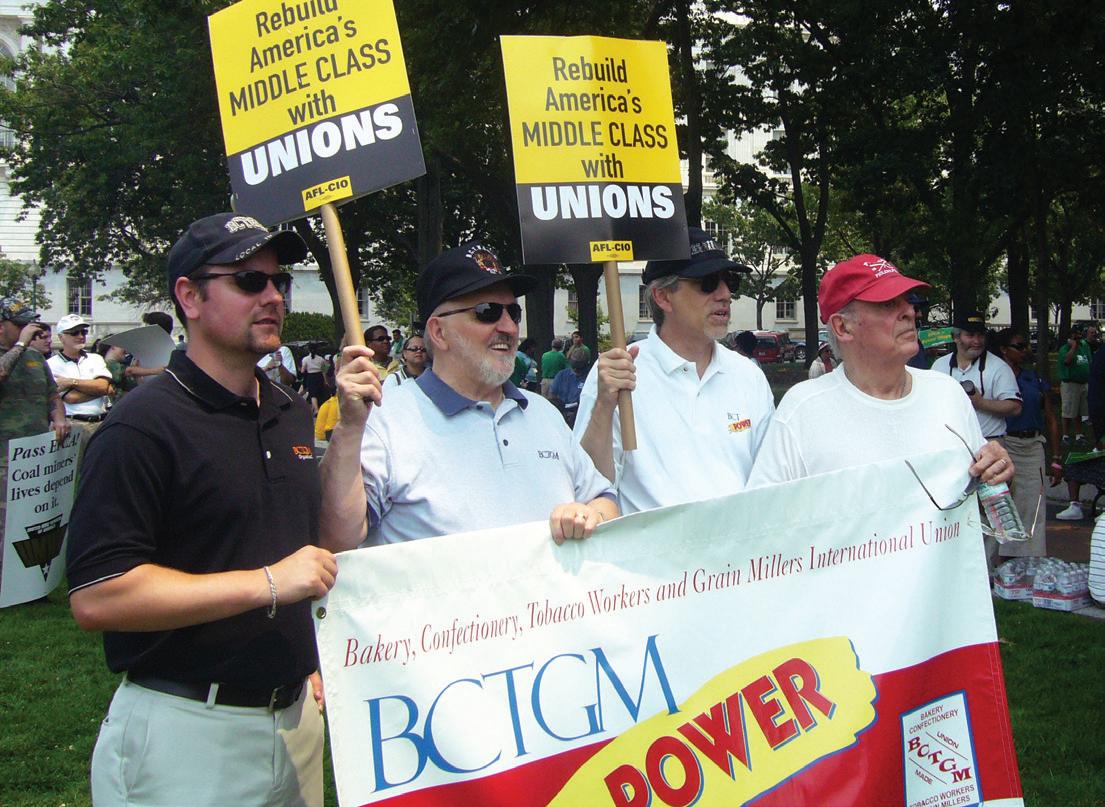

Thibodeau took over as International Representative and Auditor.
In February 1994, Thibodeau was elected as International Vice President, Region I. He was elected to fill the post of International Executive Vice President by the Union’s General Executive Board in May of 1998. Thibodeau was reelected as International Executive Vice President at the 2002, 2006 and 2010 International Constitutional Conventions.
Thibodeau spent his working life making sure American workers had the benefit of a fair day’s wage, a healthy workplace and the dignity that comes with a Union contract. He lived out his retirement at his home in Searsmont, Maine with his wife, Helen, until her passing in 2019.
“Members of this Union can be proud of the lasting impact of Joe’s life and career” Shelton continues. “His legacy is one for the ages.”
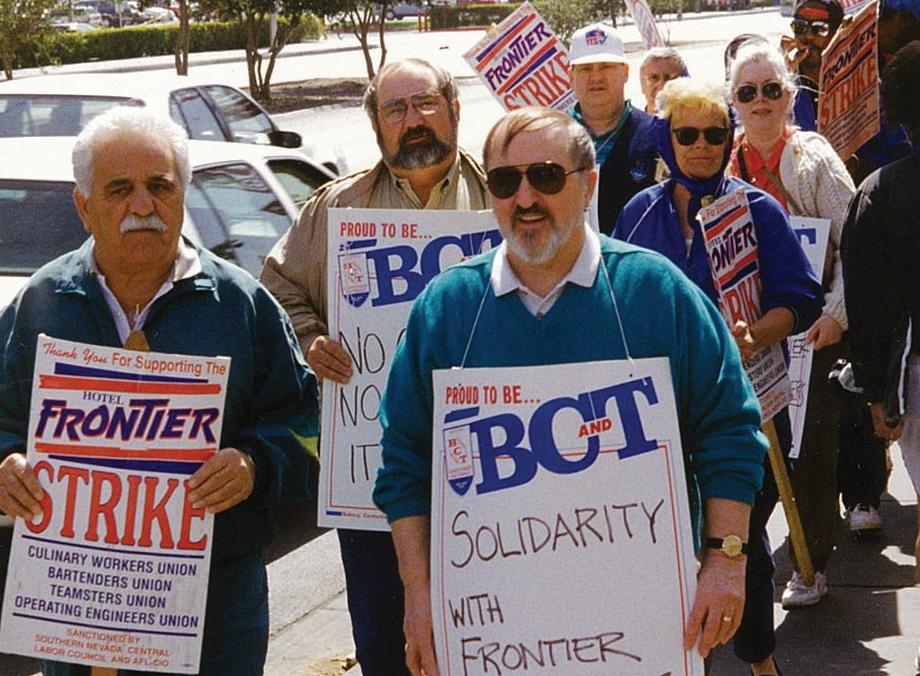
The 42nd Constitutional Convention of the Bakery, Confectionery, Tobacco Workers and Grain Millers International Union is less than one year away!
The theme of the 2026 Convention is UNION WAVE: Mobilize, Organize, and its format will deviate from tradition in the following ways:
DATES: July 28-30, 2026
The five-day format has been shortened to three days. The 2026 Convention will convene on Tuesday, July 28, 2026 and adjourn on Thursday, July 30, 2026.
LOCATION: Hollywood, Florida
For the first time in several decades, the Convention will not be held in Las Vegas. The 2026 Convention will be held at The Diplomat Beach Resort, Hollywood, Florida.
INCREASE TO NUMBER OF ELIGIBLE LOCAL UNION CONVENTION DELEGATES:
Per Article III, Section 4 of the Constitution, amended at the 41st Constitutional Convention in 2022, the minimum number of delegates that each local union is eligible to send to the Convention is now equal to two (2) delegates. Each subsequent delegate eligibility bracket has increased by one (1) delegate until the maximum delegation size of ten (10) is reached.
Under the new rules, local unions with a monthly average International per capita tax on its dues paying membership of less than 251 shall be entitled to two (2) delegates; from 251 to 500 to three (3) delegates; from 501 to 750 to four (4) delegates; from 751 to 1,000 to five (5) delegates; from 1,001 to 1,400 to six (6) delegates; from 1,401 to 1,800 to seven (7) delegates; from 1,801 to 2,200 to eight (8) delegates; from 2,201 to 2,600 to nine (9) delegates; over 2,601 to ten (10) delegates.
Per Article III, Sections 5 and 6 of the Constitution, amended at the 2022 Convention, the hard-copy delegate Credential form has been eliminated.
At least forty (40) days prior to the opening of the Convention local unions must submit a certified list of the their duly elected Convention delegates to the International Union’s Secretary-Treasurer. The names of the delegates representing each local union shall be posted to the International Union’s website no less than fifteen (15) days prior to the convening of the Convention. Delegates to the Convention may be asked to show identification at the registration desk upon arriving at the Convention, rather than presenting hard copy Credentials complete with the seals and signatures of their respective local unions.
Please SAVE THE DATE and look for more information forthcoming!

ON JUNE 1, sixty-five members of BCTGM Local 1 (Chicago), went on strike at the Teasdale Latin Foods facility in Hoopeston, Ill. Teasdale Foods manufactures canned beans and hominy, sauces, spices and tortillas at factories across the country.
The striking workers in Hoopeston can, pack and distribute a variety of beans that are sold under the Teasdale brand, as well as under store brands including Walmart, Giant, Aldi and Jewel.
The hard-working members are fighting against changes to scheduling and management rights, the outsourcing of jobs, and a proposal to move to a two-tier compensation system.
“Scheduling is a big issue,” reports Local 1 Recording Secretary/Business Agent Rochelle Ross. “The members currently work ten hours, four days per week and they use that fifth day of the week to take care of any personal needs or schedule medical appointments.” Ross says the company is trying to convert this schedule to eight hours, five days per week, which the workers are not open to.
The company also wants to outsource Union jobs and go back to an older two-tier wage system. “They want to totally change the working conditions in the plant, said Ross. “Returning to that is a non-starter.”
BCTGM International President Anthony Shelton issued the following statement in support of the striking Union members:
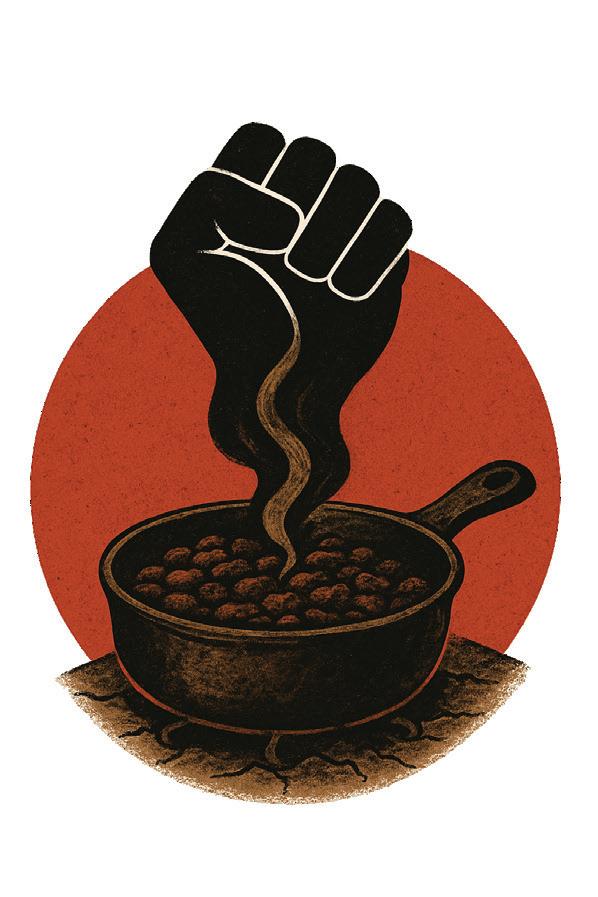
“Like so many of our employers, Teasdale is beholden to a private equity company and has lost touch with the hardworking men and women at the heart of the company’s success.
“I commend our BCTGM Local 1 brothers and sisters for holding their ground for what they and their families deserve—and urge our local unions and fellow members to offer them solidarity and support however possible.
“The BCTGM International Union will support the workers at Teasdale in Hoopeston for as long as it takes to achieve a fair contract.”
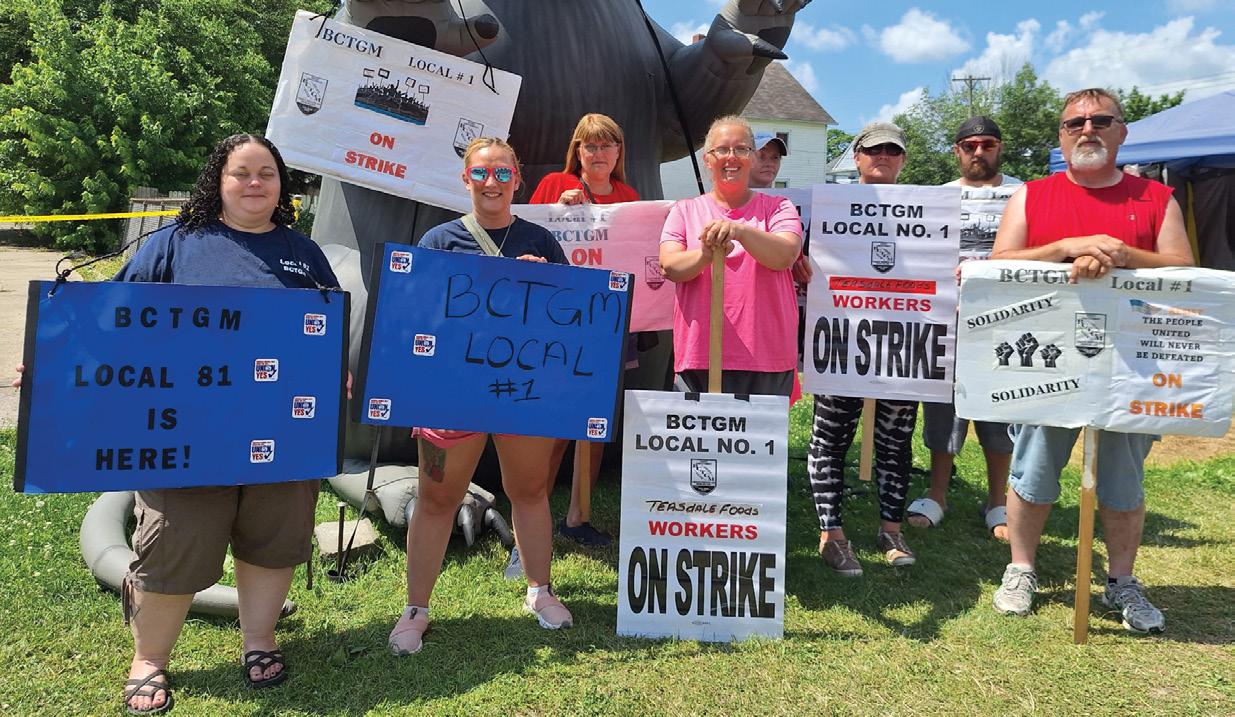
BCTGM International President Anthony Shelton and International Secretary-Treasurer David Woods spent some time with BCTGM Local 410 (St. John’s, Newfoundland) members at Grupo Bimbo in St. John’s in July.
“This is the first time executive officers from the International Union have ever visited our bakery,” says Local 410 Financial Secretary/
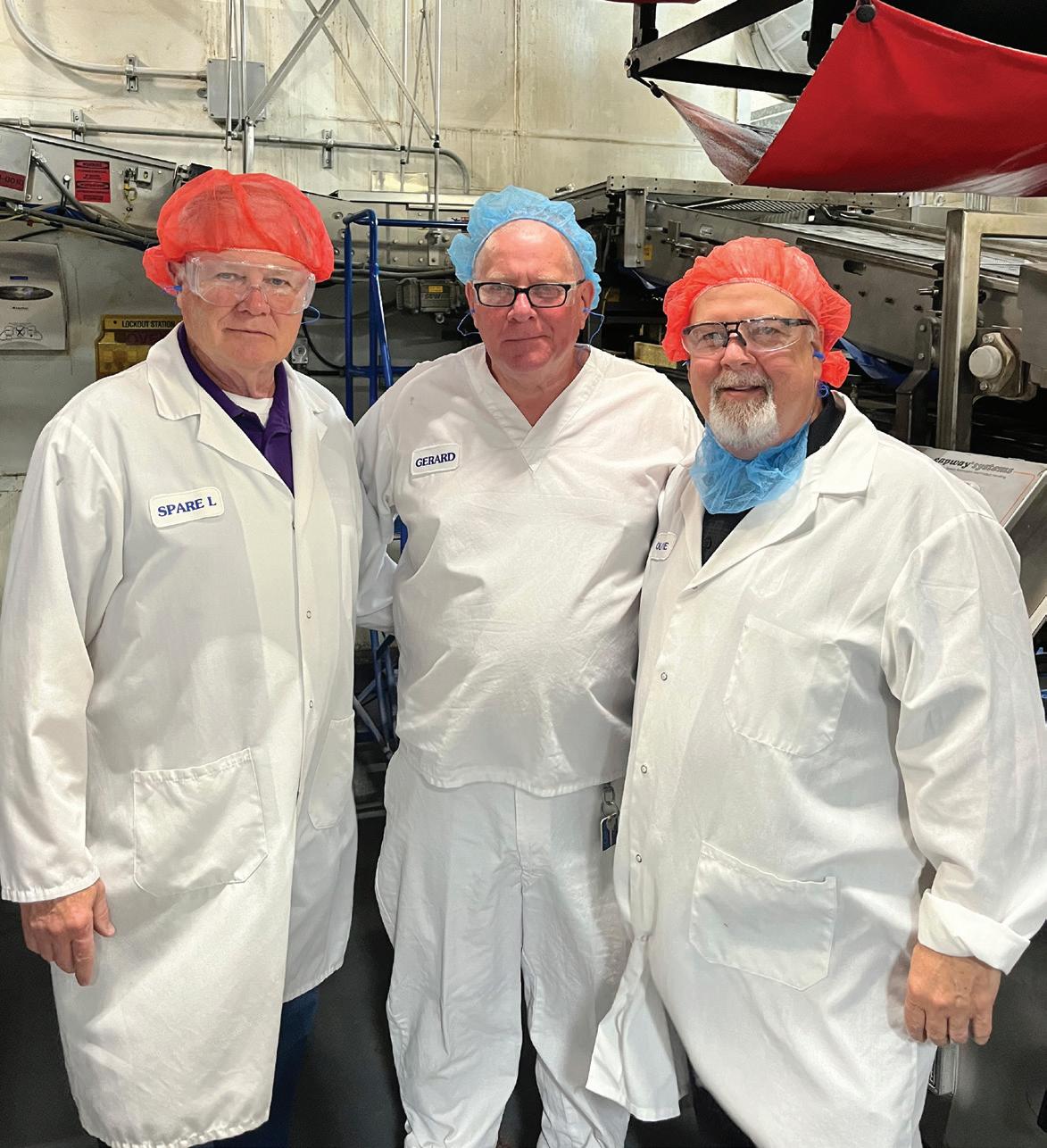

Chief Shop Steward Pam Rose. “The members were excited to meet them, and even more so to learn how down-to-earth they are.”
While touring the plant, President Shelton recognized several older machines like the ones he used to work on at Colonial Bakery in Chattanooga, Tenn. “They don’t make them that way anymore,” he says. “It brought back a lot of memories for me, I liked seeing that.”
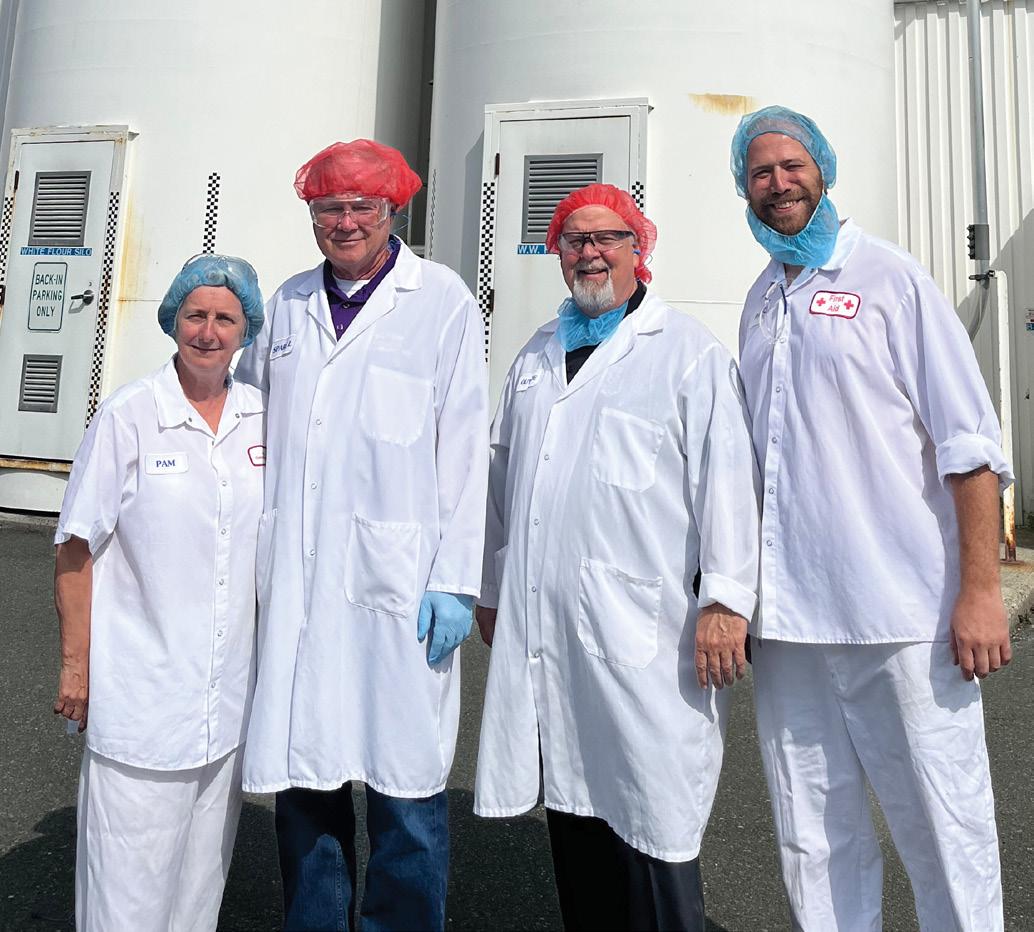
According to Rose, the workers also thought it was really neat. “He worked on a bread molder once upon a time, which is the same job I have today,” she says.
One of the most important aspects of servicing Union shops has always been making that connection, according to President Shelton. “It’s important to me that they know I have been there—that I understand the pride and also the challenges that come with this
work,” he continues. “Relating to the members is often the key to offering the most quality representation.”
Workers at Bimbo in St. John’s make Dempster’s brand hot dog and hamburger buns, Dempster’s white and whole wheat breads and Dempster’s Ancient Grain, Multi and 12-Grain breads.
The factory also produces product for Villiggio and Our Compliments brands, as well as food service resetaurants such as Burger King, A&W and Dairy Queen.



Founded in 1895, the Tobacco Workers’ International Union (TWIU) was the official Union representing tobacco industry workers for much of the 20th century. In its early days, the Union’s biggest fight was against a large holding company called the American Tobacco Company – which had monopolized the tobacco market in the United States (read more in the box below).
The decades to follow would see challenges that similarly mirrored the times: Rapid membership growth during World War I, followed with sweeping losses due to new management offensives. Racial division sowed by the Union’s top officers, which led to an internal insurgency to overthrow its conservative national leadership in the 1930’s and elect a more diverse guard.
Shifts in labor law, anti-smoking pressures, new technology and more would eventually push the Union to identify like-minded AFL-CIO-CLC International Unions that the tobacco workers could merge with.
In 1978, the TWIU officially teamed up with the Bakery and Confectionery Workers International Union (B&C) to form the Bakery, Confectionery and Tobacco

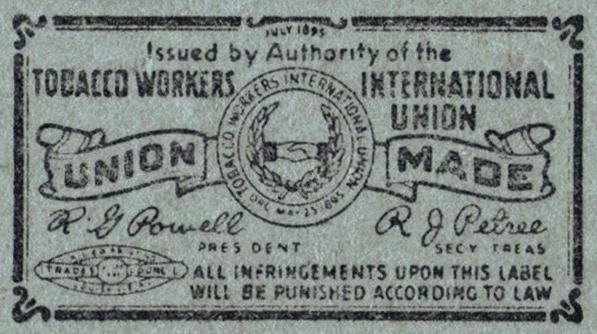
Workers International Union (BC&T). Then-TWIU President Renee Rondou writing of the decision:
“With the increasing trend of tobacco companies to buy out companies in other industries in order to protect their money in the face of anti-smoking pressures, several firms in the baking industry were purchased and are now controlled by tobacco companies. Consequently, many members of the Bakery Workers and Tobacco Workers are now working for the same employer.”
In its early days, the biggest challenge facing the TWIU was a huge holding company called the American Tobacco Company, which was monopolizing the tobacco market in the U.S. TWIU Secretary-Treasurer E. Lewis Evans warned in 1899, “This consolidating of factories under one roof will lessen the expense of manufacturing so that the Trust can cut prices and drive all the independent factories out of business.”
Evans was referring to the ‘Tobacco Trust,’ as the American Tobacco Company came to be known. “The Trust is trying to buy out all the firms who are making success with the [Union] Label,” he later said. “You see, we build up the business for a man, then he sells out to the Trust.”
The TWIU grew a lot of respect with members of the

AFL as it hammered away at this practice with an aggressive Union Label campaign. The vintage advertisement to the left informing, “Union men say they will not use the following brands of tobacco”–all brands which had sold out to the Trust.
The Union Label in all industries would gain power from this campaign–signaling a company’s alignment with its workforce and an indication of quality, trusted craftsmanship.
As the Union grew clout within the tobacco market, it would also negotiate contract terms with its companies in exchange for rights to print the Union Label on their products.
Federal regulators would eventually file an anti-trust suit against American Tobacco, and the U.S. Supreme Court ordered it dissolved in 1911.
Today’s North American tobacco employers have embraced anti-smoking sentiments and shifted to find success in the changing landscape.
“In Canada, tobacco companies aren’t allowed to advertise at all anymore, but they have figured out how to profit from telling people not to smoke,” says BCTGM Local 261T (Quebec, Canada) President Pierre-Luc Doucet. “The media found it very newsworthy, for instance, that Philip Morris (one of the largest tobacco companies in the world) would so aggressively encourage people to stop smoking,” he says. “This opens the door for the company to say— ‘well we have this new product called IQOS (vape brand), which can help you stop smoking.’”
Cigarette-smoking has faced a diminished outlook legislatively and in the shifting of public opinion in both the U.S. and Canada. Tobacco companies in the South have also found ways to come out on top, according to BCTGM Local 196T (Owensboro, Ky.)
President Kevin Lindsey.
“We have gone from about 160 employees here at the old Red Man Chew facility in Owensboro (owned by Swedish Match and recently acquired by Philip Morris International) to now approaching 1,300 in just five or six years,” he says.
This meteoric growth has been the effect of a tobacco industry innovation which has taken the U.S. industry in particular by storm: the nicotine pouch. Members of Local 196T at the factory specifically

manufacture the brand called Zyn.
“Zyn is a nicotine-based product, portion controlled into single pouches, and they come in a can,” Lindsey continues. “They go in your lip similar to loose tobacco or snuff, but it’s a cleaner alternative. There’s no spitting involved, which has really appealed to people.”
Remarkably, Local 196T—which operates in Rightto-Work Kentucky—has managed to convert every single one of those new workers into BCTGM members.
“They flock to the Union,” says Local 196T Financial Secretary Mike Aldrich. “It’s just a matter of staying consistent with our representation—the influence we’ve earned from that alone makes it as easy as showing up and doing the administrative work to register the new-hires.”
That consistency mostly involves leadership presence at the factory during every shift, and holding regular education trainings. “We hold education classes multiple times a week and at different times of the day so we can accommodate all shifts,” Lindsey says.
BCTGM tobacco workers and their employers are acutely aware of the cultural challenges that constantly hover over their industry—but there’s a level of confidence in the fight that seems baked in. “We’re in this together, and that applies to the members and the company,” says Lindsay. “It’s been challenging, but also really exciting.”
If history is any indication, their Union jobs will be as safe as their willingness to fight for them.


In June, the BCTGM Voices Project podcast interviewed leaders from the BCTGM’s Tobacco Sector. In this exerpt, Local 176T (Durham, N.C.) President Aaron Graves (AG) and Local 261T (Quebec, Canada) President Piere Luc Doucet (PLD) discuss some of the rules and challenges around the production and sale of tobacco in the U.S. vs. Canada.
Q: Where is tobacco grown for the U.S. and Canadian markets, and where does the Union work begin in this process?
AG: Here in the U.S., tobacco is predominately grown in the southern region. North Carolina and Kentucky consistently rank in the top for acreage and pounds harvested, but Virginia, Tennessee, South Carolina and Pennsylvania also contribute.
The BCTGM represents workers on the manufacturing side, but the Teamsters may also have a hand in the transport of it.
PLD: At Rothmans, Benson & Hedges here in Québec, they mostly order tobacco leaves through auction. A little bit is grown in Ontario, but they also import from Guatemala, China, Brazil and Argentina to name a few. BCTGM Local 261T members’ work begins once it comes into the factory.
Q: What are some challenges you face around the sale and unionized production of tobacco in Canada vs. the United States?
PLD: Canada has very strict laws, especially for the packaging of certain tobacco products. We have been required to print images on the outside of cigarette packs of people with mouth
cancer and other health problems caused by smoking, along with written warnings about the common health risks. A new law passed recently, which added that requirement for the inside of the packs as well. So, to open the pack you push from the bottom with your two thumbs. A flap will now come up with those images on the inside, too. There is no tobacco marketing of any kind allowed in Canada.
AG: Being in a Right-to-Work (for Less) state (North Carolina), we have to be creative and diligent to maintain our Union numbers at Local 176T. We are very fortunate to not have those rules around the packaging, but have discontinued a lot of advertising in the States as well. There are restrictions, but it’s not complely illegal.
PLD: There is no Right-to-Work in Canada, and Québec’s laws are even more Union-friendly.
When people are hired to work at Rothmans, Benson & Hedges, they are sent right around the corner to my office to talk about joining the Union. All the trades from the tobacco factory to the janitors, security guards and even a couple of the office secretaries are members of BCTGM Local 261T. We are very proud of that.
EPISODE 40: THE PAST, PRESENT AND FUTURE OF BCTGM TOBACCO INDUSTRY WORKERS
SCAN TO LISTEN

The annual Tobacco Presidents and Vice Presidents Meeting convened in Myrtle Beach, S.C. this past July. The conference was hosted by Local 203T (Richmond, Va.), and attended by eleven leaders from eight local unions representing tobacco workers in Virginia, Kentucky, North Carolina, West Virginia and Quebec (Canada).
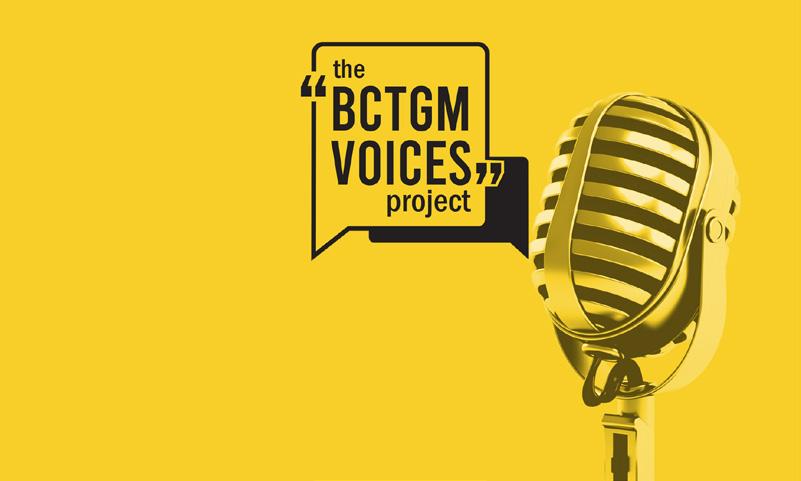
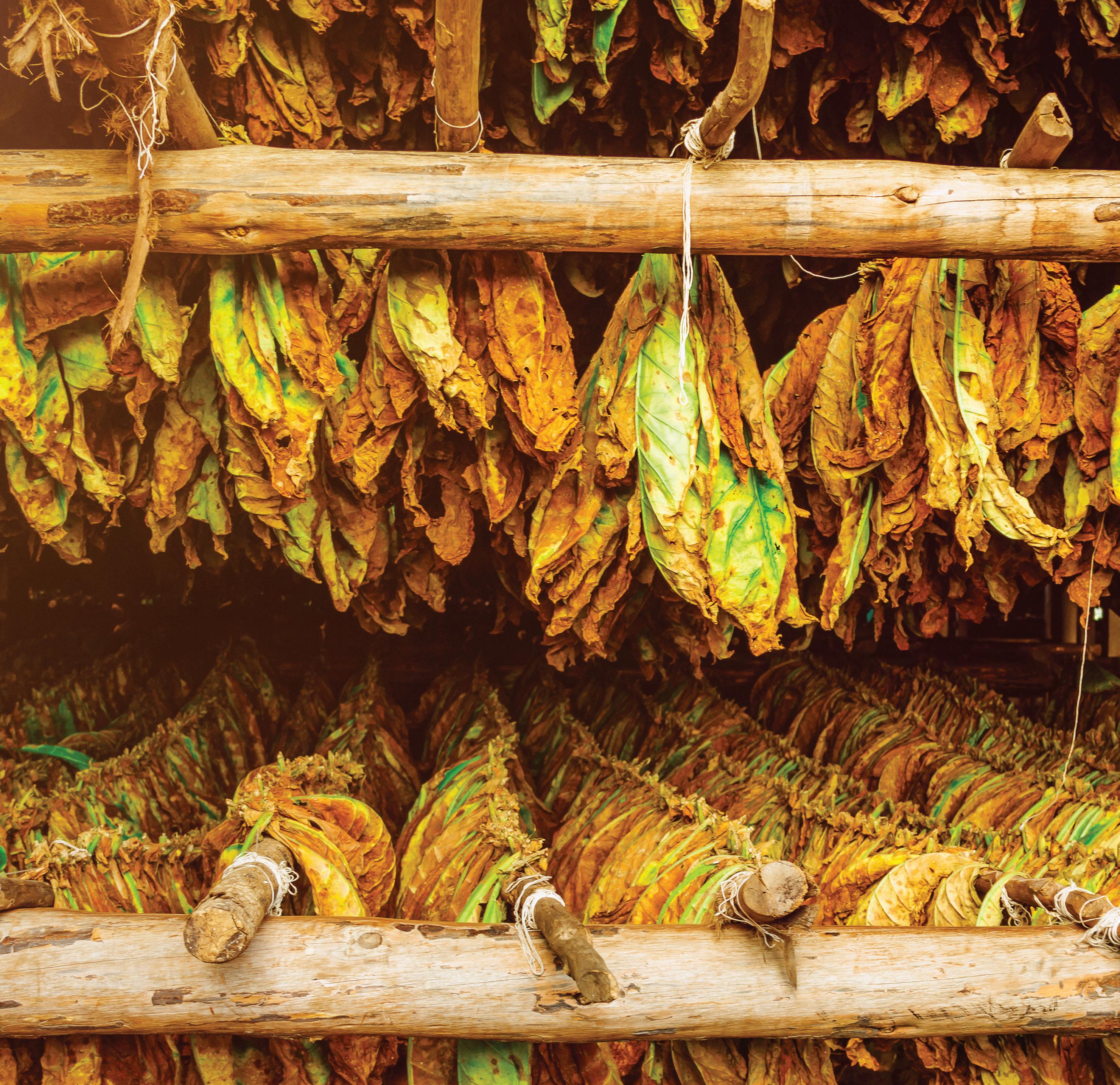


Republished with permission from Northwest Labor Press
Written by Don McIntosh
More than
three years after a bitter 40-day strike,
MondelēzNabisco seems to have decided it wants labor peace.
In votes tallied Feb. 28, members of the Bakery, Confectionery, Tobacco and Grain Millers International Union (BCTGM) ratified a new five-year national collective bargaining agreement. The deal was recommended by the union bargaining team and covers about 1,000 BCTGM members at Nabisco bakeries in Portland, Chicago, and Richmond, Virginia, as well as distribution centers in Aurora, Colorado; Addison, Illinois; and Norcross, Georgia.
The agreement raises hourly wages $5.25 over five years, starting with an immediate raise of $1.25 on March 1 and followed by annual raises of $1. Most mixers and bake shop processors were making $31.82 an hour, so they’ll make $37.07 an hour by the end of the new contract.
The new agreement also maintains the company’s extraordinary health insurance benefits. Mondelēz-Nabisco pays the full premium for coverage that includes the worker plus their spouse and children. Workers pay no deductible, and have only a $15 copay for most doctor’s office visits.
The national contract is supplemented by local level agreements. BCTGM Local 364, which represents about 215 employees at Nabisco’s Portland bakery, won a commitment by the company to hold product sales at least once per quarter at the Portland bakery. During the sales, employees can buy up to two cases of heavily discounted Triscuits, Chips Ahoy, or other products they make.
BCTGM Local 364 Business Representative Cameron Taylor said the tone was very friendly when the two sides met for national bargaining Feb. 10-20 in Fort Lauderdale, Florida.
“It was a total 180 from last time,” Taylor said. “The company came in and wanted to get a deal.”
The new agreement runs through Feb. 28, 2030.
BCTGM Local 68 (Baltimore) and Bakery Express Mid-Atlantic recently celebrated a huge milestone for Walter Smith, who has worked for the company and been a member of the Union for 50 years.
“I presented him with an International Union 50-Year Service Certificate and Gold Card, as well as a $500 gift card from Local 68 to show our appreciation,” says Local 68 Business Manager Gary Oskoian.
Pictured here, Bakery Owner Charlie Burman (left) and Oskoian (right) also present Smith (center) with a celebratory cake to thank him for all his years of service.


BCTGM Local 167G (Grand Forks, N.D.) has ratified a new two-year agreement with North Dakota Mill in Grand Forks.
The new pact includes 3% wage increases each year of the contract, an additional $50 stipend toward winter work clothing every two years, an additional $50 yearly stipend toward safety-toed work boots, major improvements to the first-year vacation allowance and more.
“We already had a good contract, so keeping what we had was the priority,” says Local 167G Vice President Jared Tozer.
Doubling the vacation allowance in the first year of employment was a big win, according to Tozer. “We wanted to show that we are committed to the
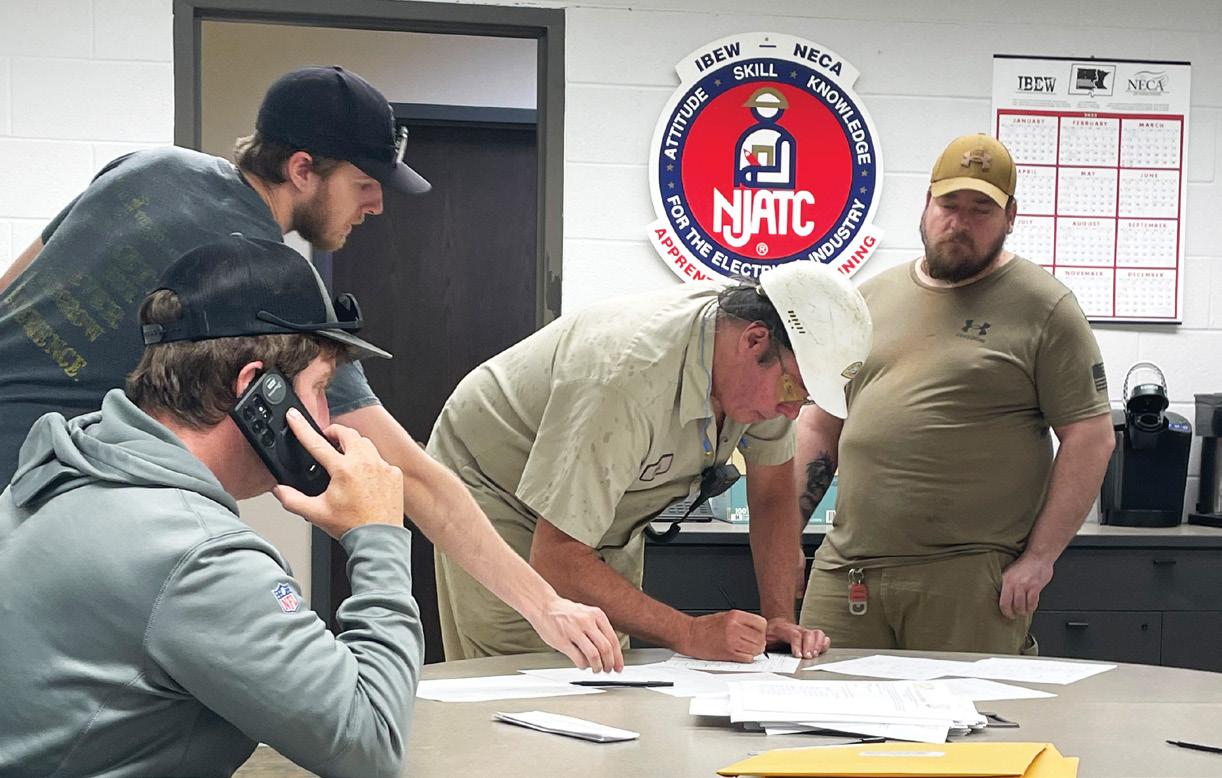
work-life balance of everyone, including the new hires,” he says.
Tozer adds that North Dakota Mill, the largest stand-alone mill in the United States, is owned by the state of North Dakota. “Due to that, a lot of our pay raises have an extra layer of bureaucracy to clear,” he says. “We were able to get a provision in there that will offer a 50-cent raise after two years on certain jobs.”
In their last contract, this strategy benefitted nine employees; in this one it will benefit 31.
Since taking office, Tozer and Local 167G Head Steward/Recording Secretary zMichael Sersland have been committed to significantly improving the Union density in the plant. “We were at 52% when I was elected, and now have 98% membership (114 members),” Tozer noted. “That was a huge factor in being able to get this done.”

BCTGM Shop Stewards continue to sharpen their knowledge and share road-tested tips with one another. On this page, members in the East-Central,
Western and Canadian Regions gather to complete courses with BCTGM International officers and field staff. Along the way, building solidarity and strengthening the foundation of the entire organization.
BCTGM Local 70
Grand Rapids, Mich.
Led By: East-Central Region International Representative Lisa Gregory
Number of Students: 75
Shops Covered: Kellanova, Hearthside and Roskam
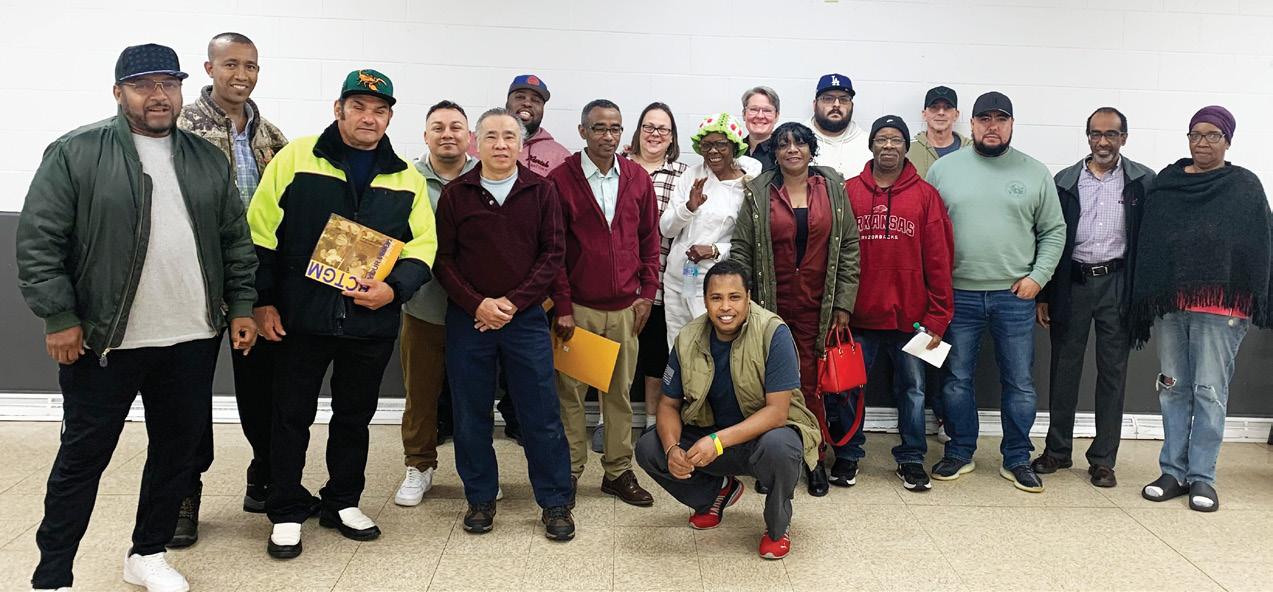

BCTGM Local 406
Moncton, New Bruswick (Canada)
Led By: Canadian Region International Vice President Ron Piercey and International Representative Karl Walker
Number of Students: 34
Shops Covered: Bimbo Bakery & Bimbo Depot (Moncton), MCRI (Moncton), Bonté Foods (Moncton), Hampton Inn (Halifax, N.S.), Scotia Gold (Halifax), Grupo Bimbo (St. Jonn’s, Newfoundland) and lBEW (Halifax)
BCTGM Local 232 Phoenix, Ariz.
Led By: Western Region International Representative Andrew Gutierrez
Number of Students: 6
Shops Covered: Bimbo Bakeries USA (Phoenix), Sara Lee (Phoenix) and Bay State Milling (Tolleson)

The personal and financial hardship caused by wildfires, hurricanes, flooding, blizzards and other disasters impacts thousands of families across the country each year, including BCTGM families.
Over the past two decades the BCTGM International Union’s Disaster Relief Fund has helped BCTGM members and their families that have been severely impacted by such tragedies by providing them with monetary assistance. Sadly, the frequency of these disasters appears to be growing.
The Disaster Relief Fund was established


by the BCTGM General Executive Board in 1999 to provide resources to BCTGM members and their families facing financial hardship as a result of natural disasters. Due to the generosity of BCTGM local unions and members, the Fund has been able to assist many of our members and their families victimized by unforeseen and natural disasters—including those shown on this page.
The BCTGM’s Disaster Relief Fund is made up of voluntary, one-time contributions from BCTGM Local Unions, members, staff and officers. To make a donation or request assistance, please contact the International Representative or Vice President in your region.




BCTGM POWER is here when our union families need it the most, by partnering with brands you know and trust to offer special Union member protections.
Hardship help benefits for Union members and their families include:
Strike Benefits: If you’re on strike, you may be eligible for a grant you’ll never have to repay.
Layoff or Furlough Assistance: We’re here to help eligible union members who have been laid off or furloughed.
Save-My-Home-Hotline: Are you having trouble paying your mortgage? Get a free, confidential talk with a housing counselor.
Disaster Relief Grants: If you’ve been impacted by a natural disaster, you may be eligible to receive a $500 disaster relief grant that doesn’t have to be repaid.
Medical Bill Negotiating Service: If you’re struggling to pay doctor and hospital expenses, get help negotiating medical bills.